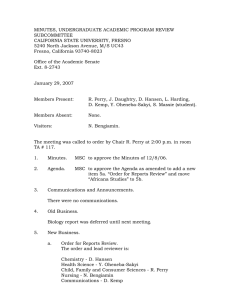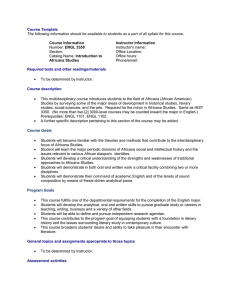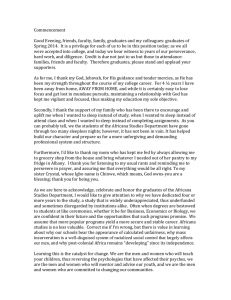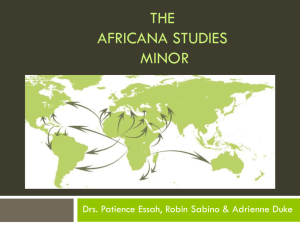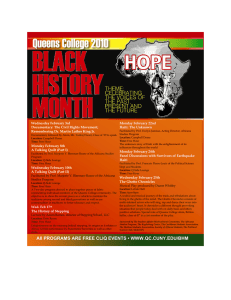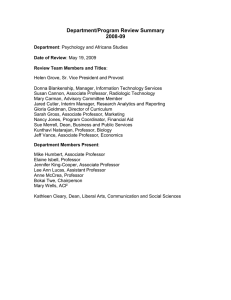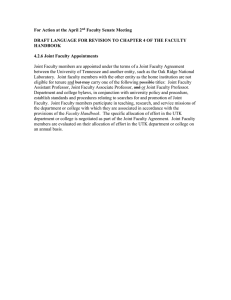Message from new Vice-Chair Dr. Bertin Louis
advertisement
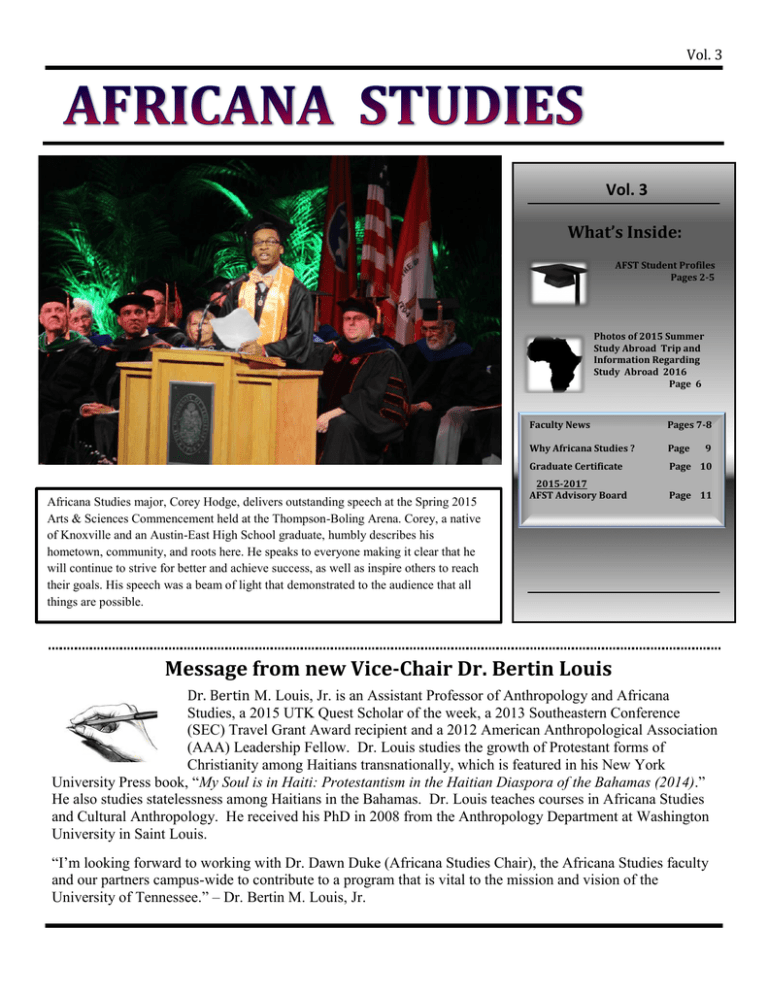
Vol. 3 Vol. 3 What’s Inside: AFST Student Profiles Pages 2-5 Photos of 2015 Summer Study Abroad Trip and Information Regarding Study Abroad 2016 Page 6 Africana Studies major, Corey Hodge, delivers outstanding speech at the Spring 2015 Arts & Sciences Commencement held at the Thompson-Boling Arena. Corey, a native of Knoxville and an Austin-East High School graduate, humbly describes his hometown, community, and roots here. He speaks to everyone making it clear that he will continue to strive for better and achieve success, as well as inspire others to reach their goals. His speech was a beam of light that demonstrated to the audience that all things are possible. Faculty News Pages 7-8 Why Africana Studies ? Page Graduate Certificate Page 10 2015-2017 AFST Advisory Board Page 11 9 Message from new Vice-Chair Dr. Bertin Louis Dr. Bertin M. Louis, Jr. is an Assistant Professor of Anthropology and Africana Studies, a 2015 UTK Quest Scholar of the week, a 2013 Southeastern Conference (SEC) Travel Grant Award recipient and a 2012 American Anthropological Association (AAA) Leadership Fellow. Dr. Louis studies the growth of Protestant forms of Christianity among Haitians transnationally, which is featured in his New York University Press book, “My Soul is in Haiti: Protestantism in the Haitian Diaspora of the Bahamas (2014).” He also studies statelessness among Haitians in the Bahamas. Dr. Louis teaches courses in Africana Studies and Cultural Anthropology. He received his PhD in 2008 from the Anthropology Department at Washington University in Saint Louis. “I’m looking forward to working with Dr. Dawn Duke (Africana Studies Chair), the Africana Studies faculty and our partners campus-wide to contribute to a program that is vital to the mission and vision of the University of Tennessee.” – Dr. Bertin M. Louis, Jr. Laquesha Wilson Laquesha Wilson is graduating with a double major in Africana Studies and Sociology. As a volunteer for The University of Tennessee, she represents the university proudly through her involvement. She is a current Chair of the Black Cultural Programming Committee, an organization with the mission of raising awareness on campus by providing positive programming that caters toward the African American student body and the Knoxville community. She’s a mentor in the Multicultural Mentoring Program, where she mentors first year students in order to help them transition from high school and become better acclimated to campus. Wilson is a member of Me4UT (Minority Enhancement for the University of Tennessee), a recruitment organization that focuses on enhancing diversity at UT by recruiting students from diverse backgrounds. She’s a Leadership and Service Ambassador. She stated, “I lead co-curricular leadership programs in classrooms on campus as well as in the community, with hopes that they actively engaging students in service called, continue service in the Knoxville area.” She and four other people founded a social justice organization The Committee, committed to the access, advocacy, and representation of underrepresented students at the university. Broadening her leadership skills, she was able to study abroad in South Africa through the Africana Studies Program. She stated, “I never thought that I would be able to travel abroad, but with the help of the faculty and staff within the Africana Studies, that dream became real. I was able to give back in South Africa and it helped me to continue my work here in Knoxville.” She also believes that what she learned in the classroom has benefited her greatly and allowed her to be a social justice advocate. Wilson and some of her peers lobbied to reinstate a program called UTLSI (The University of Tennessee Lead Summer Institute), which is a conditional access program for underrepresented groups. The Committee reestablished UTLSI in order to ensure the success of underrepresented groups. Originally from Nashville, Wilson will become a teacher for Greater Nashville Corps with Teach for America where she will be teaching sixth grade English while pursuing her master’s degree in Education Policy. Her favorite quote from Nelson Mandela is, “We should never forget those on whose shoulders we stand; and those who paid the supreme price for freedom.” That quote really resonates with her because she respects the people who paved the way for the 2opportunities that we all have today. “We should never forget those on whose shoulders we stand; and those who paid the supreme price for freedom.” Corey Hodge Corey Hodge is graduating with a major in Africana Studies and a minor in English. As an active leader on campus, he still finds time to be a Resident Assistant for the university’s Massey Hall and a coordinator for the Black Cultural Center’s monthly Mahogany Soul Café. He’s also a drummer for Knoxville’s Kuumba Watoto Unity Drummers. As an Africana Studies major he has learned a lot about how certain groups of people are held back. He says, “I learned about some of the accomplishments of the marginalized, the jaw dropping accomplishments in environments where such things seemed near impossible. Being a black male senior coming from an urban, Title-1 elementary, middle, and high school system, to still be here and with plans to go even further, is itself an accomplishment.” This May he hopes to be accepted into the nonprofit organization, Teach for America, in Kansas City, Missouri, where he will teach Language Arts. He states, “A leader, mentor, doctor, hero, and principal for the youth of today and tomorrow.” Never one to shy away from controversy, Hodge does not support Black History Month because he believes that his history, our history, women’s history, and all history is too complex and deep to limit to a single month. He also believes that every day and month is our history month. He quoted a saying, “An opportunist sees the wolf at the front door and the next day is wearing a fur coat.” “An opportunist sees the wolf at the front door and the next day is wearing a fur coat.” 3 Hannah Summers Study Abroad Experience Cape Town, South Africa My trip to Africa was absolutely amazing! We became one with the locals, building gardens, feeding people in need, and helping individuals within the communities with their everyday lives. We became regulars in the communities and people grew to love us as much as we grew to love them. We worked with underprivileged pre-school aged children, and this was probably my favorite part of the entire trip. Seeing those little faces smile, dance, and play warms my heart each and every time. I learned so much about others, myself, and life as a whole. One of my favorite Xhosa proverbs states, "A person is a person through other people." This sums up what I learned most about my trip because it means that each person is who they are through other people helping them and supporting them to become something. As much as we are an individualistic society, I learned so much about the importance of community and helping one another. Next year I plan to begin law school to pursue a career in International Law for Human Rights. I want to continue to work in many different countries in Africa along with others in order to promote individual rights and work toward a happier, more loving world. Hannah Summer, our 2015 Study Abroad Award recipient, shares some of her most memorable experiences during her first trip to Africa and updates us on her future post graduate plans. Above: Hannah pictured on top of Table Mountain (one of the seven wonders of nature). “Thank you, Africana Studies for your help in sending me to Africa. I appreciate this opportunity more than words can express.” At the right: Collage of one of Hannah’s favorite days at Nomande Preschool where a vegetable garden was built by the study abroad students. 4 Elizabeth Oguguam Elizabeth Oguguam is receiving a Bachelor of Arts in Communication Studies in May 2015. Being open to different cultural backgrounds and perspectives is what led her to become a member of the Diversity Student Leaders Society. The purpose of this organization is to provide high quality educational opportunities and to promote understanding by embracing and celebrating the dimensions of diversity contained within each individual. After being inducted into the program, she later became the Social Media Coordinator, helping to create more awareness through social media to bring diverse individuals together. She currently is a work-study student for the Africana Studies Program, where she was inspired to commit to their annual study abroad trip to South Africa in the summer of 2015 for service learning and to discuss social injustice in impoverished neighborhoods. Studying abroad in South Africa will benefit her career goals by exposing her to different cultures and perspectives. Since this experience will give her a global perspective, it will set her apart from individuals in her career who are less exposed to different viewpoints. She stated, “In the entertainment industry you must know how to work with people from a wide range of backgrounds.” Miss Oguguam hopes to be successful in the entertainment industry and own her own business. After she graduates, she plans to begin her career in the entertainment industry as a personal assistant, radio personality, or entertainment correspondent. She hopes to learn more of how she could venture off into conducting her own projects in acting, hosting, and singing. She also plans to further her education by getting her master’s degree in Global Communications. She stated, “I’ve always had a hunger for knowledge and learning new information that could enhance my artistic expression.” Nelson Mandela’s words inspired her, “There is no easy walk to freedom anywhere, and many of us will have to pass through the valley of the shadow of death again and again before we reach the mountaintop of our desires.” She understands that it will not be an easy road to success and that she will have to fail numerous times before succeeding in any of her endeavors. However, that will not stop her from achieving all that she has set out for herself. “There is no easy walk to freedom anywhere, and many of us will have to pass through the valley of the shadow of death again and again before we reach the mountaintop of our desires.” 5 2015 Study Abroad South Africa Study abroad students learned a lot about the economic status, social challenges, and issues regarding opportunities in the townships they visited. They attended lectures and learned that both race and economic status were factors in determining quality of life. They also visited the Department of Social Development and Social Services where many South Africans of low socioeconomic status receive public assistance. Study Abroad Summer 2016 Contact Dr. Amadou Sall for more information: Email: asall@utk.edu UTK Africana Studies Program UTK Intl. Civic Engagement: Service Learning 2nd Summer Session in SOUTH 6 AFRICA (Earn: 6 credits) July 7 – August 9, 2016 AFST Faculty News Dawn Duke was on Faculty Development Leave in Fall 2014. Her text, ““La política es arte, es poder y es ciencia.” María Dámasa Jova. ¿La primera delegada negra de la República?” is scheduled for release in Mujeres negras en la historia de Cuba, an edited volume by Daisy Rubiera Castillo and Oilda Hevia Lanier to be published by La Editorial Ciencias Sociales in Havana Cuba. Her book review, Oshun’s Daughters: The Search for Womanhood in the Americas by Wanessa Valdés, will be published in Hispania in December 2015. She is one of three editors for the book project, Celluloid Chains: Slavery in the Americas through Film. In February 2015 she presented on Cuban film and literature at the 10th Conference on Cuban and Cuban American Studies at FIU. In March 2015 she traveled to Cuba to research women writers and the son cubano for her second book project and while there, on March 20th, she participated in a panel discussion “Reivindicando las mujeres mambisas en la lucha por la independencia” at an event that paid homage to Mariana Grajales. In Spring 2015 Dr. Duke was a discussant for the Africana Studies Program Film Series and presented on the film Rues CasessNègres. She closed out the 2014-2015 academic year with research in Bogotá Colombia, and conference and seminar presentations at the University of Hong Kong and UNC Chapel Hill. Dr. Dawn Duke, Chair Africana Studies Program The 2014-15 academic year was very busy for Dr. Bertin Louis. He served as the Interim Vice chair of Africana Studies in Fall 2014 and published two Op-Eds: One with Dr. Tobias T. Gibson (“Blue vs. Black is a Domestic Security Concern”: http://www.stltoday.com/news/opinion/blue-vs-black-is-adomestic-security-concern/article_b47a8019-326c-539981ac-a6e8f0988e30.html) and another called “Celebrating Revolutionary Blackness: Haitian Flag Day and the Importance of the Haitian Flag” on Mark Anthony Neal’s NewBlackMan blogspot Dr. Bertin Louis, Vice Chair Africana Studies Program http://newblackman.blogspot.com/2015/05/celebratingrevolutionary-blackness.html Dr. Louis also celebrated the publishing of his anticipated book “My Soul Is in Haiti: Protestantism in the Haitian Diaspora of the Bahamas” with New York University Press (http://nyupress.org/books/9781479809936/) and was recognized as a University of Tennessee Quest Scholar of the Week (http://quest.utk.edu/2015/bertin-louis/), was named Port Academic, Inc. Author of the Month (March 2015) https://www.facebook.com/237689793020176/photos/a.317722275016927.71465.237689793020176/679 320862190398/?type=1&theater And his book was named one of the “Best Haiti Books of 2014” on the “Haiti: Then and Now” blog: https://celucienljoseph.wordpress.com/2014/12/27/imagining-and-reimagining-haiti-through-literatureand-reading-in-2014/ as well as mentioned on the “The Public Archive. Reading Haiti: Ten Books for 2014” list (http://thepublicarchive.com/?p=4399). Dr. Louis also gave 8 talks and panel presentations and was interviewed by 3 different news agencies (EFE News agency, the Nassau Tribune and The Haitian Times) about his work and opinions. 7 AFST Faculty News My research is a commitment to understand the material conditions of peace and justice and seeks to empower vulnerable populations through a variety of research and teaching projects. Most recently I have worked on the movement to address human wrongs through truth and reconciliation commissions, specifically the burgeoning truth movement within the United States. This NSF funded research has engaged with a truth and reconciliation commission that took place in Greensboro, North Carolina in the late 1990s. While truth processes have been the focal point of academic discourse for at least a decade, the majority of relevant research has examined them outside of a North American context. My research has argued that reconciliation processes in the US not only emerge as a site for producing knowledge about past violent events, but serve as an important avenue for contemporary political activism. My work has demonstrated how US reconciliation processes link racism and class exploitation with fundamental economic developments that produce violent outcomes. This perspective broadens our geographic Dr. Josh Inwood, understandings of rights claims for oppressed and marginalized populations Africana Studies Program through a focus on cross ethnic alliances. This research also highlights the continuing significance of the Civil Rights and labor struggles in the U.S. South following the end of segregation and the way legacies of racism, violence, and social activism continue to frame anti-racist struggles. Additionally, my research addresses the interconnected ideas of race, urban geography, and political economy most recently through an examination of the US Civil Rights Movement. This research builds on current understandings of civil rights by bringing an understanding of the political economy that emerge from the African American experience of slavery. For example, in a piece published in Environment and Planning A, I argue that the Poor People’s Campaign is an important moment to examine the changing coordinates of the US political economy. Specifically, I argue that the failure of the US civil rights struggle to remake economic processes demonstrates the limits of social democratic movements to transform capitalism. This raises questions about the ability of social democratic movements to fundamentally engage with and transform contemporary neoliberal economic policies. As an Associate Professor in the Africana Studies Program I bring these research commitments to the classroom. I often teach courses focused on civil rights and social justice for the program and I also teach courses about the African American urban experience. Welcome Aboard We welcome Dr. Matthew Quest to Africana Studies. He holds a Doctorate in American Studies from Brown University, a Masters in African Studies from the University of Illinois at Urbana, and he studied Political Science and History as an undergraduate at Hunter College (CUNY). Dr. Quest has taught African, Caribbean, and African American History at a few universities, most recently at Georgia State University in Atlanta. He is known for his original research, documenting through neglected archival sources, the intellectual legacies of CLR James, the famous historian and political philosopher. Dr. Matthew Quest Africana Studies Program 8 Dr. Quest is on the editorial board of CLR James Journal for which he is a regular contributor. He has also published with New Historian, Insurgent Notes, and has a forthcoming article in Science & Society about the influence of GWF Hegel on James’s philosophy of history. He also has written scholarly introductions for edited volumes including Ida B Wells’ Lynch Law in Georgia & Other Writings and Joseph Edwards’s Workers Self-Management in the Caribbean. WHY AFRICANA STUDIES… Africana Studies is the study of the histories, politics, and cultures of peoples of African origin both in Africa and of the African diaspora. The peoples of the diaspora include African Americans, and peoples of African descent living in the Caribbean, Latin America, and the Middle East. Newer African diaspora populations are found in Europe and Asia. African Studies encompasses the world. Our goal in the Africana Studies program is to give students a better understanding of these interconnections within the broader framework of the experiences of peoples of African origin. What can I do with an Africana Studies major or minor? You will find Africana Studies majors and minors working in the private sector (tech companies, banks, real estate, and insurance), for the government, and in non-profit organizations. Teaching at both the elementary and secondary level is a career choice for many of our graduates. Majors and minors have also pursued graduate studies in law, business, social work, and public administration. In short, the answer to the question, “what can I do with an Africana Studies major or minor?” is, “anything you want!” We look forward to discussing your degree and career plans with you. Please consult our website, web.utk.edu/~africana/ and come by our office. Program Contact Information: Attn: Dr. Dawn Duke Africana Studies Program 1115 Volunteer Blvd. 1206 McClung Tower Knoxville, Tennessee 37996 9 Africana Studies Graduate Certificate The multi-disciplinary graduate certificate in Africana Studies is intended for currently admitted graduate students wishing to develop knowledge and skills necessary to teach survey and upper-division courses in topics related to Africa and the African Diaspora. Prospective candidates for the certificate may take up to 6 hours of certificate classes before making formal application to the Office of Graduate Admissions for admission to the certificate program. Candidates must complete 18 hours of course work, taken for graduate credit and chosen from at least two different departments. Students may choose from the following courses: ANTH 414, ANTH 419, ANTH 432, ANTH 454, ANTH 523, ENGL 443, ENGL 552, ENGL 560, FREN 573, GEOG 541, GEOG 663, HIST 543, HIST 561, HIST 563, PORT 430, PORT 432, SOCI 452, SPAN 484, SPAN 586, SPAN 587. Topics and independent study courses where appropriate, and courses in the Department of Child and Family Studies and in the Department of Public Health in the College of Education, Health, and Human Sciences, may be applied to the Africana Studies certificate with the permission of the certificate coordinator. 10 Executive Committee Dr. Dawn Duke dduke1@utk.edu (Chair of Africana Studies, Spanish and Portuguese) Dr. Bertin Louis blouis2@utk.edu (Vice Chair of Africana Studies, Anthropology) Core Faculty Dr. Michelle Commander mcommand@utk.edu Africana Studies, English Chandra Dunn cdunn11@utk.edu Africana Studies Dr. Josh Inwood jinwood@utk.edu Africana Studies, Geography Dr. Asafa Jalata ajalata@utk.edu Africana Studies, Sociology Dr. Bertin Louis blouis2@utk.edu Africana Studies, Anthropology Dr. Gichingiri Ndigirigi jndigiri@utk.edu Africana Studies, English Dr. Matthew Quest mquest@utk.edu Africana Studies Dr. Amadou Sall asall@utk.edu Africana Studies Dr. Awa Sarr asarr@utk.edu Africana Studies, French Dr. Steffan Spencer sspenc11@utk.edu Africana Studies) Advisory Board Members 2015-2017 Dr. Derek Alderman dalderma@utk.edu Geography Dr. Katherine Chiles kchiles1@utk.edu English Dr. Chonika Coleman-King ccolem21@utk.edu Theory and Practice in Teacher Education Dr. Mark Dean markdean@utk.edu Electrical Engineering and Computer Science Dr. Rosalind Hackett rhackett@utk.edu Religious Studies Dr. Barbara Heath bheath2@utk.edu Anthropology Dr. Randal Hepner rhepner@utk.edu Religious Studies Dr. Tricia Hepner thepher@utk.edu Anthropology Dr. Carolyn Hodges chodges@utk.edu The Graduate School Dr. Ronald McFadden mcfadden@utk.edu Education Advancement/McNair Programs Dr. Althea Murphy-Price amurph21@utk.edu School of Art, Printmaking Dr. Anton Reece areece@utk.edu Student Success Center Dr. Marianne Wanamaker wanamaker@utk.edu Economics Dr. Courtney Wright cwright@utk.edu Communication Studies 11 Africana Studies Newsletter (Published annually) Dr. Dawn Duke, Chair of Africana Studies, Modern Foreign Languages and Literatures (fall 2015) Dr. Bertin Louis, Vice Chair of Africana Studies, Anthropology (fall 2015) Africana Studies Phone: (865) 974-5052 Fax: (865) 974-8669 Support Africana Studies We thank you in advance for your generous support of the Africana Studies program. Your donations help fund lectures, research opportunities, and study abroad programs for majors, minors, and students from the UTK community interested in the peoples and cultures of the African Diaspora, both in the United States and around the world. To donate to the Africana Studies program, visit the University of Tennessee’s giving page, at: https://web.dii.utk.edu/Alumni/. Select the Knoxville campus, College of Arts and Sciences, and then, Africana Studies Enrichment Fund to complete the remainder of the form online. If you prefer, you may contact the following office by regular mail or by phone to make a donation to the Africana Studies Enrichment Fund: Office of Development College of Arts & Sciences 2524 Dunford Hall University of Tennessee Knoxville, 37996-4000 Phone: 865-974-2365 12 1206 McClung Tower 1115 Volunteer Blvd. Knoxville, TN 37996-0412 Main Office: 865-974-5052 Fax: 865-974-8669
